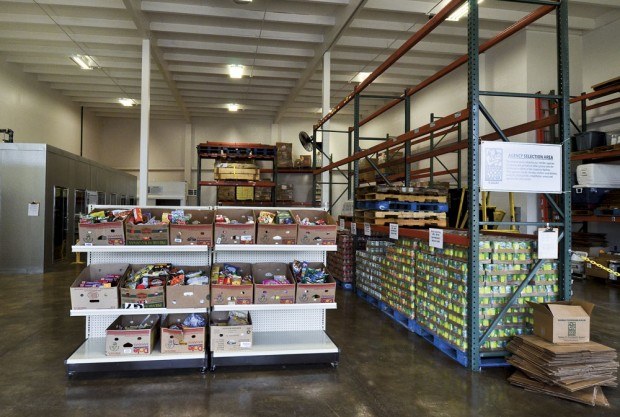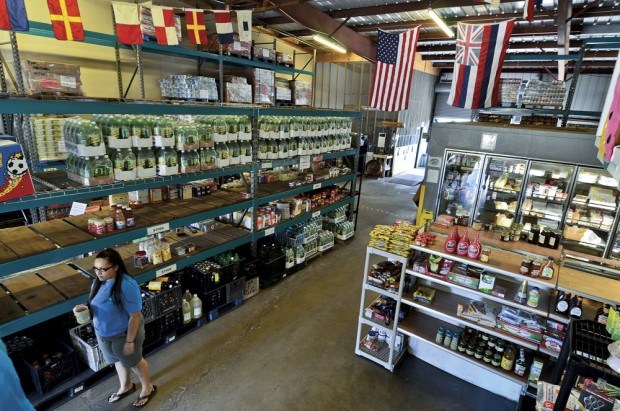LIHU‘E – Kaua‘i Independent Food Bank (KIFB) is in danger of
losing nearly a third of the food it distributes to local agencies
that feed the hungry.
Editor’s note: This is the next article in an investigative series on the food banks serving Kaua‘i. Past stories are available at thegardenisland.com.
LIHU‘E – Kaua‘i Independent Food Bank (KIFB) is in danger of losing nearly a third of the food it distributes to local agencies that feed the hungry.
“It’s not the funding, it’s the food, and food is always serious,” KIFB Executive Director Judy Lenthall said.
In an Aug. 29 letter to Lenthall, state Office of Community Services (OCS) Executive Director Mila Ka‘ahanui wrote that it will no longer provide U.S. Department of Agriculture food to KIFB, amounting to more than 200,000 pounds annually.
OCS is the state-designated agency that administers The Emergency Food Assistance Program (TEFAP) on behalf of the USDA. Under TEFAP, the USDA buys food and distributes it to the states. The states turn the food over to a state agency, such as OCS, that determines how the TEFAP food will administered and distributed to charities, such as food banks and pantries.
“Our strategic goals for TEFAP include striving for higher program accountability and use of the most cost effective and efficient food distribution system,” Ka‘ahanui’s letter states. “Through an examination of our previous practices, recalculation of administrative fund ratios and evaluation of community benefits per dollar spent, we have decided to terminate our relationship with KIFB.”
She states, “This review includes, but is not limited to analysis of total pounds distributed and total administrative costs submitted over the prior two fiscal years.”
KIFB’s costs
According to Lenthall, KIFB moved 657,000 pounds of food at an operational cost of $2.35 per pound in 2009. That figure includes the food bank’s costs to operate the SNAP Outreach Program, which qualifies low-income residents for state food stamps.
“Since our operating costs include SNAP, it’s only fair to add in the SNAP pounds; and when you do this, the (KIFB) is $1.35 per pound,” she said.
SNAP does not contribute food to the food bank. Lenthall translates food stamp dollars into pounds of food to generate a cost-per-pound number for operations.
“(In 2009) KIFB secured an additional 567,418 pounds of food from SNAP — $896,520 in new food stamp dollars divided by (a food value of) $1.58 per pound,” Lenthall said. “You have to include SNAP in the numbers because they are part of our operating cost.”
Rents and salaries often represent some of the biggest controllable operating costs for charities. KIFB’s 2009 occupancy cost for all of its programs — food distribution, SNAP, Keiki Café and the Backpack program — was $49,646, according to tax records provided by KIFB. Lenthall said its current rate is 55 cents per square foot.
Its 2009 tax audit shows KIFB total salaries and wages for all programs in 2009, including benefits and taxes, was $295,379.
KIFB distributes food to 54 agencies, 27 of which are USDA-recognized. Such agencies include churches, Kaua‘i Economic Opportunity and the Salvation Army.
Eliminating duplication
Other reasons cited by Ka‘ahanui for ending KIFB’s food distribution included “severe budgetary constraints” and “eliminating duplication of efforts by two food banks on the island of Kaua‘i.”
For the past 17 years, KIFB was the only food bank on Kaua‘i. But last year Hawai‘i Food Bank returned to the Garden Isle and has opened a competing food bank in a newly constructed industrial complex in Puhi, some three miles away from KIFB’s Nawiliwili facility.
Prior to returning to Kaua‘i, HFB discontinued its KIFB contract, in which HFB provided KIFB with 5 percent of the food it distributes annually. Initially, at least to outsiders, the split appeared amicable. But recent public comments have suggested otherwise.
HFB Board Chairwoman Linda Chu Takayama recently told The Garden Island, “(The Board) felt we couldn’t work with KIFB anymore. For whatever reason, KIFB has some tension with us … It was clear they didn’t want to have anything to do with us. In my mind, I said fine. You do your thing, we’ll do ours.”
But for HFB to maintain its ties with the national Feeding America organization, it has to serve the entire state, according to both Lenthall and Grimm.
Last month, soon after the blessing of HFB-Kaua‘i’s new Puhi warehouse, HFB President Dick Grimm began publicly accusing Lenthall of mismanaging KIFB. Many of Grimm’s accusations were published in two articles by an O‘ahu-based columnist.
“As a result of that article, certain state regulators began asking questions (about KIFB),” Takayama said.
When asked if the Attorney General’s office is investigating KIFB, Supervising Deputy Attorney General Hugh Jones said, “We generally (do not) comment on pending investigations or reveal whether an investigation is pending, with exceptions that do not generally apply here.”
Although OCS’s letter comes on the heels of Grimm’s accusations, OCS Contracts Administrator En Young, speaking on behalf of Ka‘ahanui, said, “No, (the decision) didn’t have anything to do with Dick Grimm.”
He would not, however, discuss the numbers OCS used to make the determination to discontinue service.
“The administrative ratio is a confidential document,” he said.
Speaking in general terms, Young said, “Administrative costs are submitted by food banks to OCS. The number is a little greater than operational costs, more comprehensive. Operational cost is just direct cost and includes rents and salaries.”
When asked if the USDA’s food will now go to HFB’s Kaua‘i branch, Young said, “We haven’t made that decision yet. Somebody will be contracted to distribute the food,” before the next funding year starts in January. A decision is expected by October, according to reports. He said right now, OCS is “reviewing everybody.”
“All we really want to say to the people of Kaua‘i is nobody is going to be deprived food,” Young said. “Folks will be taken care of in the best way possible.”
HFB-Kaua‘i’s costs
During HFB-Kaua‘i’s first fiscal year ending June 30, it distributed 175,000 pounds of food, according to Grimm, with 32,000 pounds distributed in June alone. Based on June’s figure, he projects the Kaua‘i branch will distribute 400,000 pounds during the coming year, excluding TEFAP.
Grimm said the branch’s cost of operations during its first fiscal year totaled $179,792. But he would not disclose what the operational cost figure he provided constituted, stating that he felt it was beyond the understanding of this business reporter.
Neither he nor Takayama would provide the branch’s rents or salaries.
“That’s not what’s important,” Takayama said. “What’s important is that we fed hungry people on Kaua‘i. It would be significant if it were government money, but it’s not. Whether it’s a mansion on a hill or a booth on a corner, people are being fed.”
She said monies to operate HFB-Kaua‘i come from private donors. When asked if those donors are provided details about rent and salaries, she said no, not usually, but they would if asked.
HFB-Kaua‘i distributes to 14 agencies, of which 12 are recognized by the USDA. All but one of the agencies is duplicating services at KIFB, according a chart provided by Lenthall.
Reconsideration requested
Lenthall and KIFB’s Board of Directors has repeatedly denied Grimm’s allegations of mismanagement to agencies, donors, county officials and the press.
Additionally, Lenthall sent a letter of appeal to OCS stating, “We respectfully request that the State reconsider its proposal to reallocate USDA commodities to an Oahu-based food bank that has recently moved to Kaua‘i rather than the existing experienced, tried and tested KIFB.”
State Sen. Ronald Kouchi, D-Kaua‘i and Ni‘ihau, also wrote a letter of response to Ka‘ahanui at OCS.
“Hurricane Iniki struck Kaua‘i while I was the Kaua‘i County Council Chair. During the aftermath of the hurricane, the KIFB was instrumental in providing goods and services to thousands of homeless and needy residents,” Kouchi’s letter states.
“They have continued to be a large part of the community and it is hoped that during the appeal process, through their contract and/or pursuant to Chapter 91, they will be able to provide your office with sufficient data to allow reconsideration of the proposed termination, as I am informed that the total pounds of food distributed and KIFB’s total administrative costs are on par with national averages,” he said.
• Full disclosure: The Garden Island Publisher Randy Kozerski is a KIFB board member. He did not contribute to nor direct the content of this article.






